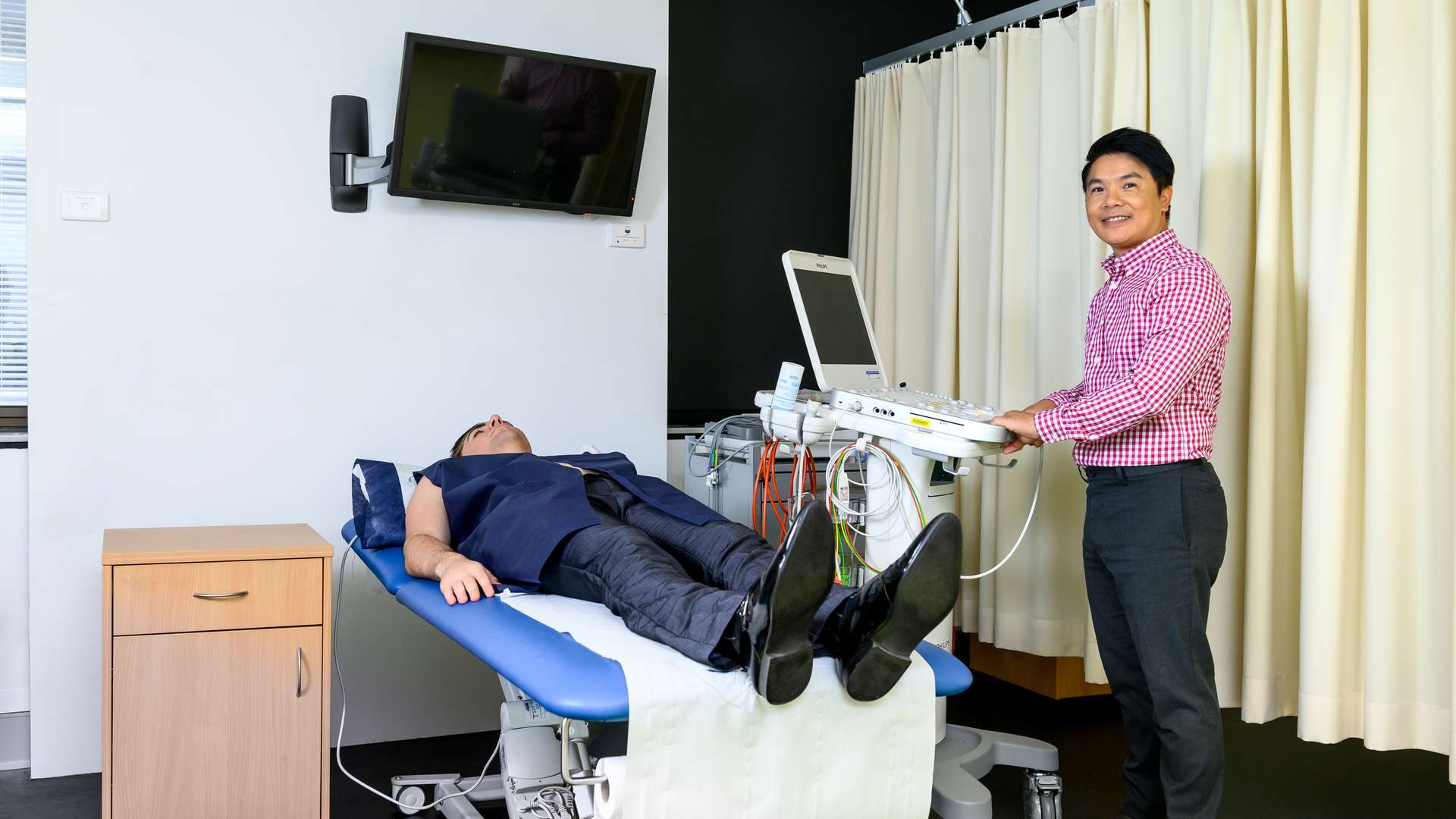
Enjoy the opportunity to join a niche medical profession with no prior degree in health sciences. The Bachelor of Echocardiography and Cardiac Physiology/Graduate Diploma in Echocardiography is the first Australian course allowing undergraduate entry to this growing field within diagnostic medical imaging.
An Echocardiographer (or cardiac sonographer) is a health professional who uses a range of diagnostic tools, including ultrasonic equipment, to produce diagnostic images, video loops, laboratory data and three dimensional and four-dimensional volumes of cardiovascular anatomy.
You will undertake a four-year full-time course of study, comprising a three-year undergraduate Bachelor of Echocardiography (Cardiac Physiology) and a one-year Graduate Diploma of Echocardiography.
You will be able to apply your knowledge of cardiac physiology, measurement science and practical echocardiographic scanning skills in the diagnostic setting.
Why choose Echocardiography at CQU?
Discover more about your industry-accredited echocardiography degree and how you'll benefit from 56 weeks of clinical experience in real-world settings. Click 'Explore Study Experience' for more information.

I would love to work in a hospital or practice as a cardiac sonographer – I love the patient interaction. And hopefully someday, when I have enough experience, I would love to open up my own practice.
Sonam Jalota
Bachelor of Echocardiography (Cardiac Physiology) / Graduate Diploma of Echocardiography
The Bachelor of Echocardiography (Cardiac Physiology) and Graduate Diploma of Echocardiography prepares you to practise as an Echocardiographer.
Employment opportunities may exist in organisations such as:
Echocardiographers are highly specialised health professionals, who require specialised education and skills to view, analyse, modify and provisionally report on cardiac scans. An echocardiographer has an important degree of responsibility within the diagnostic process and often work closely with surgical staff.
Echocardiographers are in demand in many public and private health facilities, and this demand is likely to grow due to the aging population.
Australian Sonographers and Echocardiographers are well regarded globally and there are strong employment opportunities if you are looking to travel and work overseas.
The course structure and available locations can change depending on when you want to study. You can choose the intake that best suits you in the drop-down menu below.
Enjoy a flexible first year, with online unit delivery, complemented by two compulsory two-day residential schools held at your campus of admission.
In Year 2, you'll study across three terms and throughout Years 2 and 3, you’ll transition to on-campus learning, attending classes, labs, and clinical simulations to build hands on experience.
In your final year, you'll continue to complete online theory units while you complete your last two clinical placements. Upon completion of your clinical placements, you will be required to attend your campus of admission to undertake an Objective Structured Clinical Examination (OSCE).
You must complete 23 units (192 credits):
The units you'll study are listed below. Click on a unit to learn more.
To help you plan your studies and see which unit comes first, if one unit should be completed before another and the term you will study each unit, check out our course planners.
The CV69 Bachelor of Echocardiography and Cardiac Physiology / Graduate Diploma of Echocardiography has been accredited by the Australasian Sonographer Accreditation Registry (ASAR). Students must complete both the Bachelor of Echocardiography and Cardiac Physiology and the Graduate Diploma of Echocardiography to gain accreditation.The external accreditation body sets a MAXIMUM time that individuals may be on the ASAR Registry as a Student of 5 years from the date of initial entry onto the registry. Students must register as an Accredited Student Sonographer with ASAR during year 2 of CV69 course enrolment, prior to their first clinical practicum. This requirement means that students must complete this course of study within 5 years of their student registration date in order to qualify as an accredited Echocardiographer.
320 hours of clinical placement. Students perform a broad range of cardiac physiology and echocardiographic studies under the direct supervision of a qualified cardiac sonographer, or delegate. Student learning is supported on-site by the clinical supervisor, in-conjunction with support from the CQUniversity academic unit coordinator. Clinical facilities can often only host a small number of students at a time so the placement locations are spread over a large geographical area. As a result prospective students are advised that they should prepare personally and financially to relocate for some or all of their placement.
640 hours of clinical placement. Students perform a broad range of echocardiographic studies under the direct supervision of a qualified cardiac sonographer, or delegate. Student learning is supported on-site by the clinical supervisor, in-conjunction with support from the CQUniversity academic unit coordinator. Clinical facilities can often only host one student at a time so the placement locations are spread over a large geographical area. As a result prospective students are advised that they should prepare personally and financially to relocate for some or all of their placement.
640 hours of clinical placement. Progressing to independent practice in preparation for entry to professional practice, students perform a broad range of echocardiographic studies under the direct supervision of a qualified cardiac sonographer, or delegate. Student learning is supported on-site by the clinical supervisor, in-conjunction with support from the CQUniversity academic unit coordinator. Clinical facilities can often only host one student at a time so the placement locations are spread over a large geographical area. As a result prospective students are advised that they should prepare personally and financially to relocate for some or all of their placement.
640 hours of clinical placement. Students perform a broad range of echocardiographic studies under the direct supervision of a qualified cardiac sonographer, or delegate. Student learning is supported on-site by the clinical supervisor, in-conjunction with support from the CQUniversity academic unit coordinator. Clinical facilities can often only host one student at a time so the placement locations are spread over a large geographical area. As a result prospective students are advised that they should prepare personally and financially to relocate for some or all of their placement.
Your 56 weeks of clinical placements are broken into four blocks*.
| Year | Clinical Placement Unit, Duration and Timing |
| 2 | Cardiac Clinical Unit 2 (ECHO12005)
|
| 3 | Cardiac Clinical Unit 3 (ECHO13007)
|
| 4 | Cardiac Clinical Unit 4 (ECHO20004)
Cardiac Clinical Unit 5 (ECHO20005)
|
*Standard placement dates are used where possible, however are dependent on partner hosts and are subject to change. In some cases, placements may commence outside of standard Term dates.
CQU coordinates placements for students. While we aim to keep you close to home, you may need to travel for your placement, and this travel is at your own expense. Clinical placements you complete as part of this course are generally unpaid.
If you have completed prior study relevant to units within this course, you may be eligible for credit for your past studies.
This course does not permit you to defer your offer and commence at a later date. If you are unable to commence in the term you receive an offer, you will be required to submit a new admission application or change your preference with the Tertiary Admission Centre to commence at a later date.
For your application to be considered, you must meet the following entry requirements.
Please note that places within this course are limited by a quota, and meeting the minimum entry requirements does not guarantee admission.
View the student and course profiles for this course and learn about CQU's Undergraduate Profile for Term 1, 2025 via our Institute Profile.
CQU offers a range of alternative entry pathways to help you get started. If you don’t meet the entry requirements, there are options available, depending on your background and previous experience.
While not needed to apply, you'll need to meet the following requirements throughout your studies.
The Indicative First-Year Fee is the approximate cost of enrolling in this course for one full-time academic year (eight units over two terms) for a Commonwealth Supported Place (CSP) and should be used as a guide only. Your actual fees may vary depending on the units you select to study and your study load. Check the Cost per Unit spreadsheet available on our Understanding Course Fees webpage.
Fees are reviewed each year and are subject to change. Fee estimates for the following year are expected to be available in September each year.
This course has Commonwealth Supported Places (CSPs) available, and as a domestic student, you'll be offered a CSP, provided you meet CSP eligibility requirements. CSPs are subsidised by the Australian Government, meaning you are only required to pay the student contribution rather than full tuition fees.
You may be eligible for a HECS-HELP government loan if you are offered a CSP. HECS-HELP is an Australian Government loan scheme that assists you in paying your student contributions. Provided you meet the HECS-HELP eligibility criteria, you may use HECS-HELP to defer part or all of your student contribution fees.
Part of your course costs will include Student Services and Amenities Fees (SSAF). SSAF is charged in addition to your student contribution or tuition fees and is used to help enhance your study experience. There may also be other costs as part of your studies, such as textbooks, technology expenses, travel expenses, professional certifications, uniforms, or vaccinations.
We believe a quality education can be for everyone – regardless of background, location, or life circumstances. That's why we offer a variety of scholarships and bursaries that can give you a helping hand with a range of expenses and enhance your employability.
You'll need to choose where you would like to study in the 'choose where you live' selector. This course is only available on campus, so not all states or territories will be listed.
Prior to applying, take a look at important application dates and learn about our admission considerations, such as information for domestic students with overseas qualifications, indigenous support, and elite athlete, coach and performer support. You should also check out the adjustment schemes that might be available to you and how to access them. You can also explore our offer information to learn more about what happens after you've submitted an application and how to respond to an offer to study with CQU.
CQUniversity Australia is a trading name of Central Queensland University
ABN: 39 181 103 288
RTO Code: 40939
CRICOS: 00219C
TEQSA: PRV12073